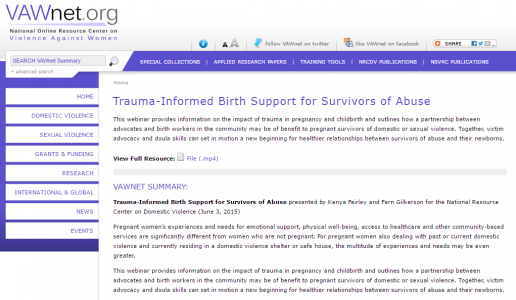Resources Library: Webinar
Start a Search:
Resources from the National Center on Elder Abuse
The National Center on Elder Abuse (NCEA) has collected all of its products (reports, webinars, podcasts, databases, etc.) in one location for easy access and availability.
Click the following links for more information on:
Elder Rights Resources - Prevention of elder abuse, legal assistance, world elder abuse awareness, and more
NCEA publications - These include information on LGBT elder concerns, financial abuse and exploitation, culturally-specifc resources, persons with disabilities, and more
Virginia-specifc state resources for elders
Supports and Tools for Elder Abuse Prevention
The Reframing Elder Abuse Project - a communications strategy and toolkit that reimagines our cultural dialogue on elder abuse
Serving Survivors of Domestic Violence with Rapid Re-Housing
Kris Billhardt provided a great presentation at the 2016 Annual National Alliance to End Homelessness conference on serving Domestic Violence (DV) survivors with rapid re-housing (RRH). Former director of Volunteers of America in Multnomah County, Oregon, and current principal of her own consulting firm, Kris has worked in the domestic violence movement for over 30 years. Kris is a pioneer in finding housing solutions that meet the needs of DV survivors experiencing homelessness. And she has found over her many years of experience that housing solutions are central – not tangential – to helping DV survivors. Increased housing stability is a significant predictor of improvements for DV survivors in many areas of life:
- Increased safety, decreased vulnerability to abuse
- Lower levels of PTSD and depression
- Higher quality of life
- Increased ability to sustain employment
- Improvements in children’s outcomes
Click here to access the webinar slides.
The Gold Standard? Comparing Privacy in HIPAA, VAWA, FVPSA, & VOCA webinar
(as presented by NNEDV and the Safety Net team on 10/18/2016)
HIPAA, VAWA, VOCA, and FVPSA all require protection of identifying information. But are they the same? Which is more protective? Is there a "gold standard" to follow? NNEDV's Safety Net team took an indepth look at the similarities and differences between privacy standards set by HIPAA and those required by VAWA, FVPSA, and VOCA, offering expert insight into how to check if programs are actually following appropriate and applicable privacy laws regarding client information and data, as well as clarity about the underlying goals of these federal laws and understand how they differ.
If you were unable to attend this webinar, the recorded version of the webinar is available at https://youtu.be/qCJagGiGiMQ.
Additional materials, handouts, and templates that you can adapt (such a model release forms and MOUs) can be found in their Confidentiality Toolkit at www.techsafety.org/confidentiality.
Transforming Care in Tribal Communities for Sexual Assault Survivors Through Partnership and Technology
For many remote Indian communities, it often is difficult to create, develop and sustain trauma-informed and culturally appropriate services and resources as part of a health response for Indigenous women who have been sexually violated. Sexual assault nurse examiners (SANE) have specialized training, education, and experience in providing quality forensic medical examinations and patient-centered care to survivors. Given high medical staff turnover, it is challenging to keep SANE nurses on staff in tribal community health care facilities. Join us for this webinar to learn how the National TeleNursing Center, Hopi Health Care Center, National Indigenous Women’s Resource Center, and Hopi-Tewa Women’s Coalition to End Abuse are working effectively in partnership to respond using telemedicine to the needs of victims of sexual assault living on tribal lands with limited resources.
Click here to view the webinar.
Trauma-Informed Birth Support for Survivors of Abuse Webinar

This VAWnet webinar provides information on the impact of trauma in pregnancy and childbirth, and outlines how a partnership between advocates and birth workers in the community may be of benefit to pregnant survivors of domestic or sexual violence. Together, victim advocacy and doula skills can set in motion a new beginning for healthier relationships between survivors of abuse and their newborns.
http://www.vawnet.org/summary.php?doc_id=4511&find_type=web_desc_TT

